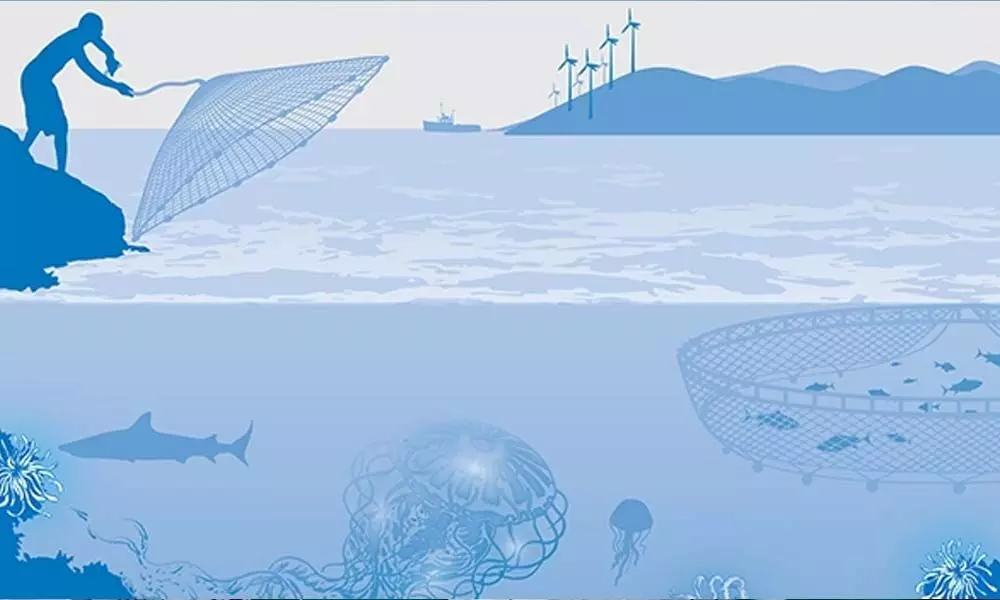Can blue economy policy open sea of opportunities for India?
Call it sea of opportunities or something else! The Union Ministry of Earth Sciences (MoES) has rolled out the Draft Blue Economy policy for India in the public domain inviting suggestions and inputs from various stakeholders including industry, NGOs, academia, and citizens.
image for illustrative purpose

Call it sea of opportunities or something else! The Union Ministry of Earth Sciences (MoES) has rolled out the Draft Blue Economy policy for India in the public domain inviting suggestions and inputs from various stakeholders including industry, NGOs, academia, and citizens. The draft blue economy policy document outlines the vision and strategy that can be adopted by the government of India to utilize the plethora of oceanic resources available in the country. This has to be seen in light of the fact that India has a unique maritime position. Nine of its 29 states are coastal, and the India's geography includes 1,382 islands. There are as many as 199 ports, including 12 major ports that handle approximately 1,400 million tons of cargo each year. Moreover, India's Exclusive Economic Zone of over 2 million square kilometers has a bounty of living and non-living resources with significant recoverable resources such as crude oil and natural gas. The Blue Economy, therefore, offers huge opportunities for sustainable economic activities and job creation, which assumes great significance particularly after the pandemic.
The Blue Economy, actually promises to help in the production of goods and services that have clear linkages with economic growth, environmental sustainability, and national security, utilizing ocean resources for societal benefit responsibly. The new policy framework is in line with the Modi government's Vision of New India by 2030.
The Blue Economy model has been envisaged as one of the ten core dimensions for holistic growth of India's economy, recognising several thematic areas, which include coastal marine spatial planning and tourism, Marine fisheries, aquaculture, and fish processing, manufacturing, emerging industries, trade, technology, services, and skill development, logistics, infrastructure and shipping, including trans-shipments, coastal and deep-sea mining and offshore energy, security, strategic dimensions, and international engagement. Mind you that India's coastal economy sustains over 4 million fisher folk and coastal communities. Significantly, the resources in these areas can spur India's economic recovery in a manner that is also beneficial to our climate and environment.
It is pertinent to mention here that a new research commissioned by the high-level panel for a sustainable ocean economy, titled: A Sustainable and Equitable Blue Recovery to the Covid-19 Crisis, co-chaired by the Norwegian Prime Minister (PM), suggests that every dollar invested in key ocean activities - such as increasing sustainable seafood production, decarbonising international shipping, scaling up offshore wind power and conserving and restoring mangroves - yields five times i.e. $5 in return, often more.
Experts are of the view that five blue stimulus actions are required to spur recovery and build a sustainable ocean economy in India and for that matter, globally. These include investments in coastal and marine ecosystem protection; sewage and wastewater infrastructure for coastal communities; and sustainable marine aquaculture. They also include incentives for zero-emission marine transport and sustainable ocean-based renewable energy. Indian policy makers will have to keep these mind, by all means.
While the ministry of earth sciences has initiated action to take forward the draft policy framework for India's Blue Economy prepared by the Economic Advisory Council to the PM, Niti Aayog has set up a high-level panel for better coordination and integration of the government of India's initiatives in the Blue Economy. At the end of the day, all stakeholders must have a clarity on why the ocean represents a major investment opportunity.

